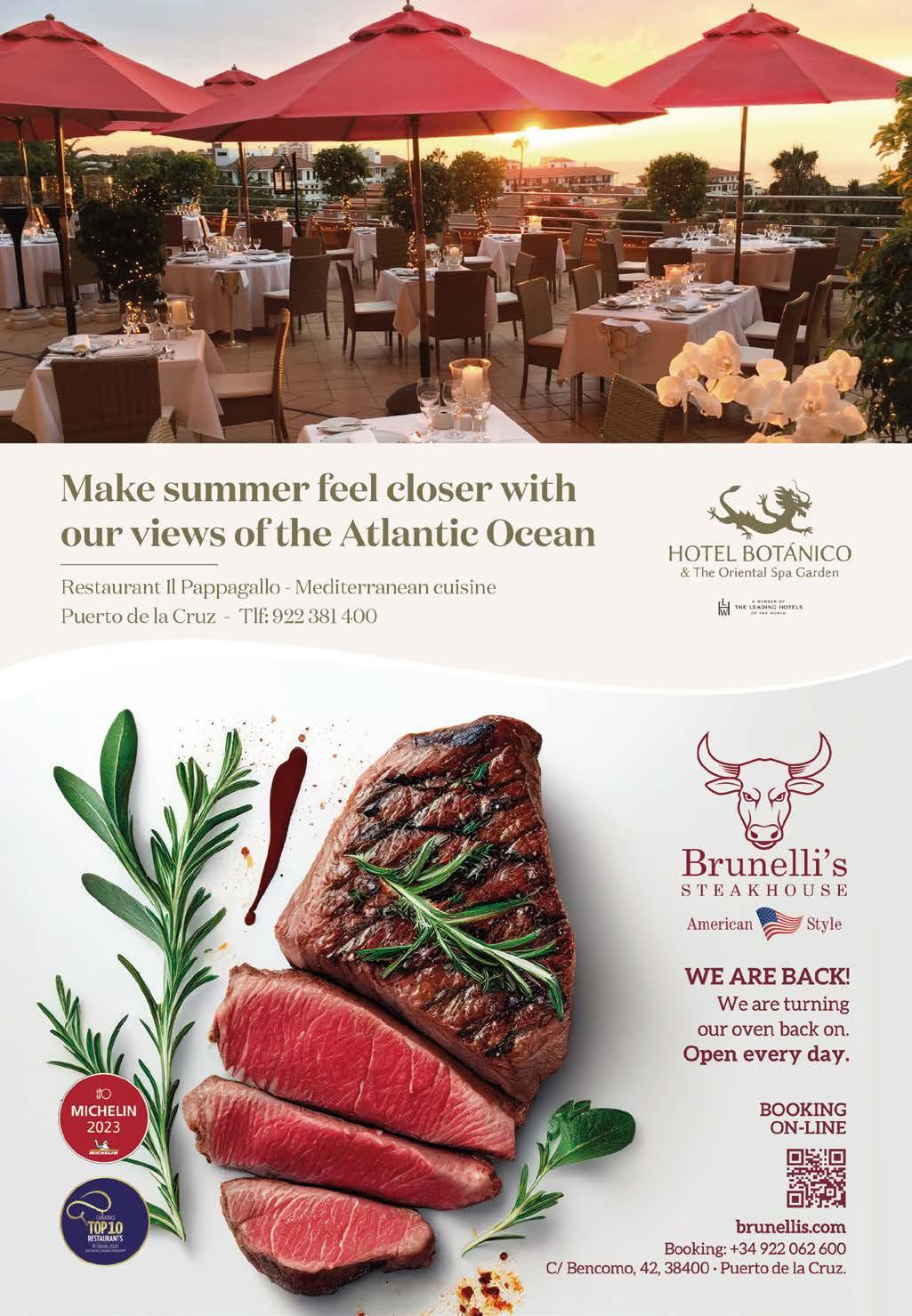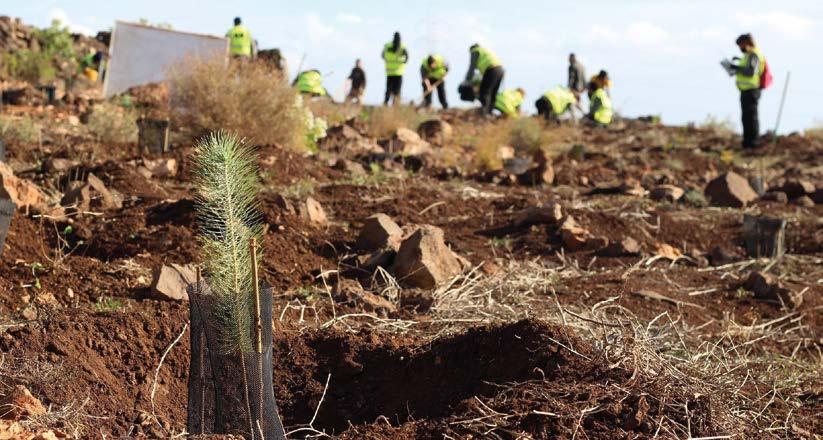
4 minute read
SAVOUR THE TASTES OF THE CANARIES FROM ABOVE WITH THESE «GASTRONOMIC TURBOPROPS»
How wonderful to have a special «boarding card » –the current NT inflight magazine– to travel on this ATR flight made of texts and fly to various parts of the Canaries which are famous for their local products, recipes and dishes that we are unlikely to come across on other shores. Not every possibility is included here, but the culinary titbits featured below will prove very appetising. Fasten your seatbelts for take-off….
The captain makes the final checks of the routing outlined below and the turboprops of our ATR plane will take us to tasty dishes we probably did not even know existed. We head to El Hierro first of all, feeling the immediate urge to try fresh fish from La Restinga, although we might also do some nosing around to locate the legendary sea snails, limpet and crab soup made by Lorena Machín. We stop off in El Mocanal for some moray eel (which are lured by fishermen with singing and whistling) cooked in onions. A delicious dish enhanced further by some local white wine made from the native baboso blanco grapes.
Advertisement
We take off once more and this time fly to Jandía in Fuerteventura for a very appetising «gastronomic ecosystem»; near the lighthouse from where we take in the immensity of the Atlantic, we «refuel » –you get my meaning– with a grouper fish stew. The fish here in El Puertito is unbeatable in terms of freshness and what better than some tasty small potatoes, onions, gofio and mojo sauce to go with it … All expertly managed in the cooking pot. The omens were already looking very good as soon as we touched down.
The signs from the plane’s flaps indicate that we are now landing in Tejina (Tenerife), where goat’s meat is the object of true «culinary veneration», accompanied ideally by a few little carafes of red wine. We could go through the different cooking styles that vary from family to family but will accept that one recommended way to tone down the strong taste of this regal meat is to cook it and then grill it briefly on hot embers; add lots of parsley and serve with chips and peppers (also grilled on embers).
As we are particularly fond of lighthouses, we point our ATR plane towards the Pechiguera lighthouse in Lanzarote. The sunsets here are an open invitation to taste the tomatoes from La Tiñosa and rice with carabinero prawns from La Santa, as prepared by chef Luis Benito. Given that we do not have to fly again until the following morning, no doubt he will also serve up a delightful gin made from aloe vera.
Next day at dawn, our rather unusual flight map has La Gomera and the Hermigua area marked on it. There are many attractions to savour here but, almost like a religious obligation on the island, we opt for a hearty watercress broth, although not before we have tried some almogrote mature cheese paste and a few chunks of tuna cooked in mojo sauce. White wine made from forastera grapes will help soften the landing of the «undercarriage», as we touch down in Gran Canaria.
Guía, Gáldar, the peaks … The «mice» amongst us will be truly enticed by the legendary cheeses, which have won multiple international awards. Coming in de flor (made using a plant coagulant) or media flor varieties, these magnificent final products are the direct result of the cheesemaking culture and impressive labours of the local artisan queseros, both men and women. Irrespective of which type of cheese you decide on, the crowning glory is to eat it with some traditionally baked pan de puño bread.
We necessarily have to end our culinary flyover and give our ATR a rest in La Palma, an island replete with the experiences of a population and of bygone days when it was customary to gather around a traditional Caldero de Fuencaliente stew to share stories and catch up on the week’s gossip.
Pure fishing tradition, passed down from generation to generation, the taste of the sea. It is something that has to be experienced in situ, needless to say; the location, the sound of the waves nearby, the fish: a very basic dish made by cooking potatoes and vegetables in salty seawater (!) together with the fish, and then serving everything on a bed of local seaweed called mujo.
BINTER SOCIAL, OUR COMMITMENT TO A SUSTAINABLE FUTURE

Binter presents Binter Social, its commitment to a sustainable future through its work in five key areas: environment, health, culture, education and sport. In order to fulfil its aims, the company contributes to over sixty projects aimed at promoting the social, economic and environmental betterment both of the Canary Islands and other areas where it operates.
The environment is an essential pillar of Binter’s business activities and one of the areas of Binter Social engagement, working with projects such as Foresta, Avanfuer, the Wildlife Recovery Centre and the Neotrópico Foundation, for which it provides air travel and engages in employee actions.
In the field of culture, the company takes part in projects such as Barrios Orquestados, which promotes the democratisation of culture through musical training, and GastroCanarias, a means of showcasing talent. It also works with the Asociación Afrocanarias Diakhase NGO, the Canarian Youth Orchestra (JOCAN), Los Sabandeños, Los Gofiones and the Casa del Timple museum.
In the field of education, it helps promote access to education for all levels of society and cooperates with projects such as Radio Ecca and Camino de los Valores, while also helping Randstad, the Adecco Foundation and the CajaCanarias Foundation achieve their educational goals.
Binter Social also cooperates with a range of health initiatives such as the Gavi vaccination project, Red Cross, Unicef, Children’s Villages and the Satocan Foundation. In addition, it contributes to the crucial work of the Canarian Blood Donation Institute by facilitating the transportation of blood and blood products between the islands.
Our commitment to sport and a healthy lifestyle is reflected in our Binter Night Run programme, which is Spain’s biggest circuit of night races, as well as our support for initiatives such as the Business Teams Race and our sponsorship of football clubs UDG Tenerife and Unión Deportiva Las Palmas.










